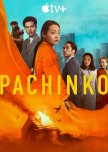They tried.
I liked this installment somewhat better than the first, which came across as being an effort to rewrite the novel with an anti-Japanese slant. I still rate the book far better than this adaptation. The main thing that bothered me was the labored Japanese accents, including the Osaka dialect even with the native Japanese actors. But that probably doesn't bother anyone who doesn't know the language. The Osaka dialect is apparently very difficult to reproduce because I have never heard non-Osaka born actors in Japan get it quite right. My Korean grandfather spoke it perfectly, having lived in the Kyoto/Osaka area since he was 13 years old. I never heard any of the Japanese Koreans speak with such thick accents. Not only were they forced to change their names, they were also not allowed to speak Korean during the occupation, so I think they were compelled to become quite proficient in Japanese. They worked very hard to blend in and not let it be known who they were. In fact I often didn't know they were Korean for years until someone told me. So the speech of the characters in this adaptation doesn't quite ring true to me. I wish the actors had been provided with more dialect coaching. But it is what it is. It's not like it's uncommon for Korean dramas to foist atrocious accents on their audience and assume no one will notice. I still appreciate that an effort was at least made to tell this very little known part of history.
Considerați utilă această recenzie?





